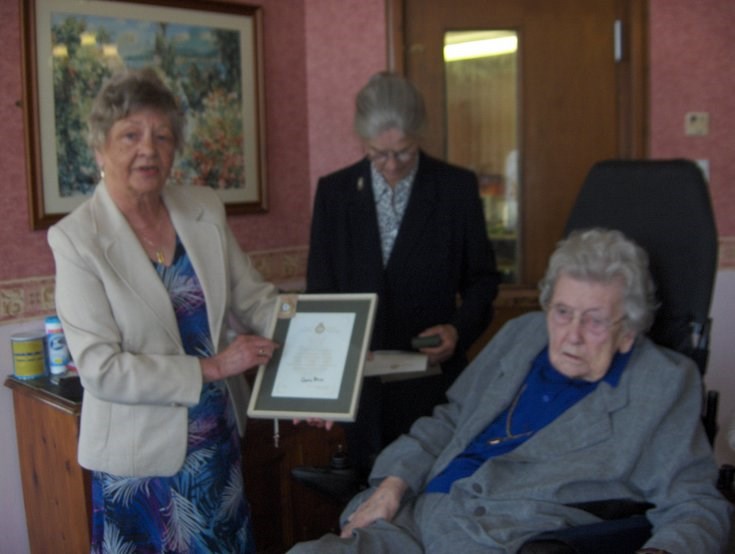
Women's Land Army Badge presented to Jane Heath (Dornoch)
Jane got off the train at Borough Green, Kent with a light heart, realizing her life was about to change. She imagined her employer would be on the platform to greet her, but a mob of people got off the train and disappeared. Eventually a man approached her and told her to hurry along, he was very busy. He drove her down the road and stopped at a group of modern houses. Jane looked at them in horror - where was the idyllic country cottage? Mrs T let them in and showed off her house and immaculate bedroom, which was to be Jane’s. Everything in its place, quite unlike what she was accustomed to. The boss was waiting and said he’d have to go but would come for her at 2.30pm. Jane got ready for work settling for breeches, sweater and boots. Mrs T took one look at these and said boots were not for indoors (even pristine new ones). They were to be left in the shed.
At 2.30pm she was collected and taken to the farm buildings up on Wrotham Hill, where she was handed over to the bailiff, who took her to a field where there were two tractors. One was already being driven by the and the one ancient one was to be hers. It took their combined efforts to get this going but eventually it was fixed up and Jane set off to collect a cultivator and start work. In due course they stopped and the foreman was friendly and offered her some of his tea. He asked her how she would get home - a long way to walk, especially up the hill. His brother had a bike he reckoned he could borrow for her. Jane enquired what time they would finish - he replied, when it got dark.
Eventually Jane got her motorbike from home, which was a great help (but the landlady was very funny about oil drips). It was nearly 8pm when she got to the digs. This was not what the landlady planned. She produced sandwiches and a glass of milk (which Jane couldn’t stand). Jane soon got to know the other tractor drivers and enjoyed the work even though it was boring at times. She got to know the local garage mechanic who reckoned he knew of a cottage locally, where she could look after herself. (And it was a proper cottage such as she imagined). The area was of course under the flight path of both UK and German planes. A bomber was brought down close by, but fortunately no one on the ground was hurt.
The farm they were working on was one of the smaller ones being managed by the Talbots and once the cultivators were finished, they could return to the main farm for the winter work, ploughing, cultivating and preparing for drilling, all to be done by Christmas time. Then there was plenty of repairing buildings and over hauling machinery. Potato clamps were opened up and the potatoes sorted for size and sacking up for sale, etc. Spring came, with crops to sow, silage and hay to be cut and so the cycle started again, with the farm tractors kept busy. Time off was pretty scarce but, in the winter, Jane joined the Badminton Club, meeting in the Village Hall and became a competent player in the local team with matches played against neighbouring villages.
So the cycle continued until the W.L.A. Hierarchy encouraged Jane to
apply for a post at Swanley Horticultural College. After her interview Jane was selected for the post of supervisor of the Land Girls, getting experience with specialized horticultural equipment and cultivation. They were involved in reclaiming any non-productive areas such as golf course, playing fields, tennis courts and verges and growing suitable food, crops on these areas. The War Agricultural Executive Committee planned the cropping. One crop was growing vegetable marrows. Jane discovered that these were to be made into jam. It was a way to bulk up more expensive fruits. In Kent the growing season is more or less continuous so there were always crops being sown, hoed and harvested
The Land Girls came for six weeks training then went off to their jobs and a new batch arrived. The welfare of the girls in her charge was also one of Jane’s responsibilities. A wide and varied set of problems had to be sorted. One advantage of the Swanley job was that Jane could live at home, travelling each day on her motorbike. One day, one of the W.L.A. Organizers came to her to encourage her to apply for a job advertised in the Daily Telegraph. The job was as a welfare officer in Aylesbury, Bucks. By this time, she had an Austin Seven and off she went confidently. At his stage the Land Army was being wound down as men were returning from active service. Jane thought she would enjoy the challenge of a new career. When the interviewers asked her why she felt she had any qualifications for such a job, she replied that she felt she had the natural aptitude for it. Her confidence must have been impressive as she got the job. It certainly led to her continuing career in welfare work.
Dimensions: jpeg file